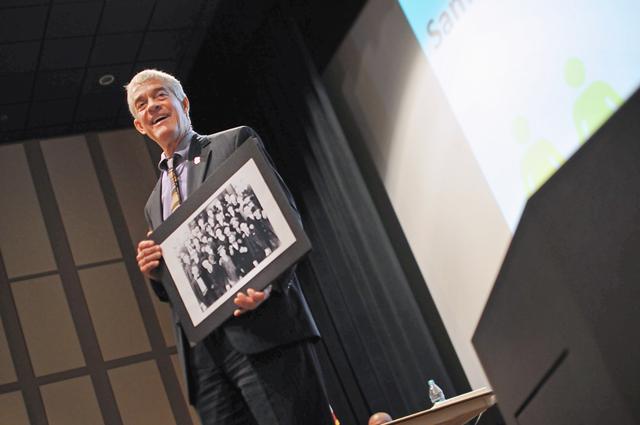N.C . State held a forum on same-sex marriage and issues of equality Wednesday night in an effort to resolve questions and hold discussion about the recent proposal to put a ban on same-sex marriage into the North Carolina constitution.
Maxine Eichner , a UNC-Chapel Hill law professor and forum panelist, said how the public reacts to this amendment in the May 2012 primary is important because of its lasting consequences.
“Once this amendment is passed, it is bedrock in the state,” Eichner said. “I have been telling my students that if you care about issues of equality and family, on a scale of 1 to 10, this is a 12.”
Senate Bill 514, the bill in question, states that “marriage between one man and one woman is the only domestic legal union that shall be valid or recognized in this State. This section does not prohibit a private party from entering into contracts with another private party; nor does this section prohibit courts from adjudicating the rights of private parties pursuant to such contracts.”
A common misconception Eichner said people have is that the amendment would only ban same-sex marriage. However, Eichner said many more rights would be limited or completely eliminated should the amendment pass, including rights to family hospital visitation, to make medical decisions for an incapacitated partner, to make funeral and burial arrangements, to inherit from one another and to be named guardian or conservator if one partner becomes incapacitated.
Eichner also said the list of rights infringement goes on—and she acknowledged that her list likely doesn’t include all of the effects, especially those that would affect N.C. State students on campus—to include the denial of domestic violence protection for unmarried couples as well as the denial of the current child custody rights for domestic partners.
But according to Eichner , the majority of North Carolinians are not in favor of limiting these rights. Instead, she said the way the amendment is written is too confusing, both for the public and for legislators themselves.
“When N.C . citizens are asked if they support same-sex marriages or civil unions, we are currently above the 50 percent level. In the past few weeks, if N.C . citizens are asked if they support the language of the amendment, by the comfortable majority they are saying they would vote for [the amendment],” Eichner said. “That shows that most voters don’t understand what this amendment means.”
For Rupert Nacoste , an N.C . State psychology professor and forum panelist, the conflict surrounding same-sex marriage is not a solitary issue of discrimination, but instead has been a recurring issue throughout American history.
“We struggle with an anxiety about how to interact with people who sometimes do not look like us or do not sound like us. And that anxiety is causing some of us to want to keep other Americans in a category of ‘they’ versus ‘we,'” Nacoste said. “The problem, though, is we have made a diversity promise to all Americans. Diversity, as it turns out, is the core value of the American identity. It is the American promise.”
The Student Senate, in an effort to show disapproval for the proposed amendment, created a bill publicly denouncing it, and called for the government to turn their focus elsewhere. This bill will be put forward for Senate approval Wednesday.
“The proposed amendment has vague and untested wording which will result in a significant period of time and state money spent on court cases to determine the meaning of the bill. North Carolina State University Student Government strongly encourages our state legislature to focus on more important matters at hand including jobs, hurricane relief and education,” the bill reads. “The Student Government of North Carolina State University does not support the proposed constitutional amendment, and we support all North Carolina State University students and their right to be treated as equal citizens.”
According to Alanna Propst , a freshman in political science and first-year at-large senator, the issue is not about whose ideology is correct. It is about supporting civil rights—for everyone.
“Regardless of people’s prior opinions on the matter, it’s still your community, your friends, your friends’ friends who are being affected by this,” Propst said. “Show respect and love to everyone around you for their opinion because it’s not just your opinion that counts. It’s not just going to impact you. There are people whose lives and happiness are at stake.”
Rachel Turner, a junior in biological sciences and CALS senator, said although many people see this as only an issue facing the GLBT community, it actually affects everyone.
“A lot of people think it doesn’t affect them,” Turner said. “But not supporting the GLBT community is discrimination just like racial discrimination…and I don’t think people understand just how important this is.”
According to Nacoste , it is up to the public to accept others for their differences rather than using those differences to further divide the community.
“Whenever we have fought diversity in our history, we have held ourselves back. We have fought against our own benefit,” Nacoste said. “But, when we have come to accept diversity, we have moved forward. We have grown as a nation.”








